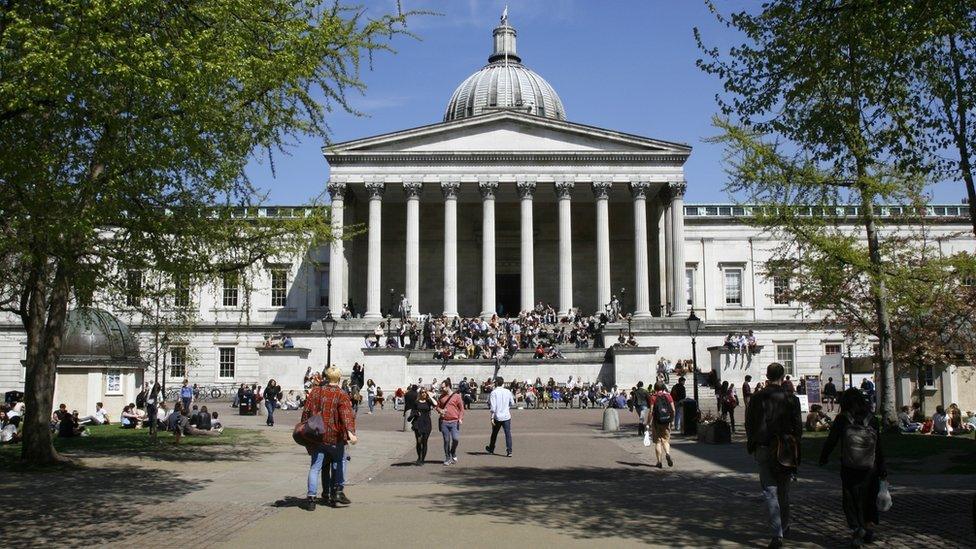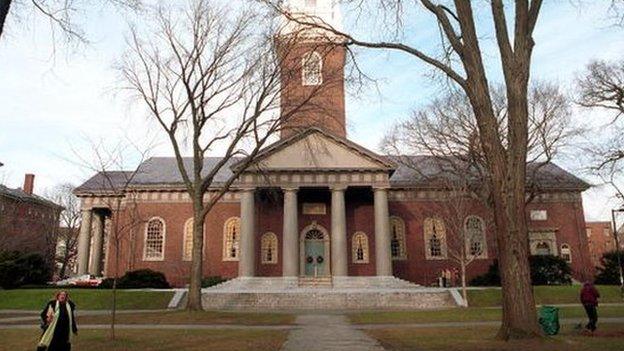UCL ban on staff-student relationships is 'a wake up call' - campaigners
- Published

University College London is believed to be the first of the UK's leading Russell Group universities to introduce a ban
A ban on intimate relationships between staff and their students at University College London is "a wake up call" for universities, campaigners have said.
Student groups said they hoped similar policies would be adopted by other universities.
UCL is believed to be the third UK university to introduce a ban and the first from the Russell Group of 24 leading universities.
It said the policy, external aimed to prevent abuses of power and sexual misconduct.
Kelsey Paske, behaviour and culture change manager at UCL, said the policy also aimed to address any real or perceived conflict of interest arising from relationships "that may have adverse effects on the working and learning environment".
UCL's new personal relationships policy for employees, first reported by the Guardian, external, prohibits "close personal and intimate relationships between staff and students where there is direct supervision".
An intimate relationship between a staff member and a student who they do not directly supervise must be declared by staff too.
The policy also prohibits intimate relationships with staff or students who are under the age of 18 or adults who are "at risk", for example someone who may need care because of a disability.
Any breach of the policy will be investigated under the university's disciplinary procedure, external, which includes possible action ranging from a formal warning to dismissal.
Dr Anna Bull, of the 1752 Group, which campaigns against sexual misconduct in higher education, said the group "strongly supported" UCL's new policy and hoped other universities would "follow suit".
She said the policy was the "most stringent in the UK", with only two other universities - Greenwich and Roehampton - having similar bans.
Dr Bull said most other universities only had policies which "strongly discouraged" sexual relationships between staff and students, which she said could mean staff were still allowed to ask students on dates or make romantic approaches.
"We think this is a real wake up call to the sector to start to take seriously their responsibilities for keeping students safe from potential abuses of power by staff," she said.
'He asked to meet in the pub'
Emma says a lack of policy on staff-student relationships at her former university - which was not UCL - meant she did not feel confident calling out inappropriate behaviour by her dissertation supervisor.
"He treated our meetings like dates, making me meet him at the pub instead of his office, asking me to the theatre, and eventually assuming that we had mutual feelings for each other," she said.
When Emma's supervisor asked to meet her after handing in her dissertation, she agreed, hoping he only wished to congratulate her.
"Instead he took me to a pub, immediately acted as if we had agreed to date, holding my hand, buying me drinks, making inappropriate comments about my teachers and classmates," she said.
Emma - not her real name - was 20 at the time, and said a clear university policy would have given her an excuse to refuse to meet him outside of university.
For example, UCL's policy states that staff with a primary role of providing supervision, teaching or pastoral care to students should ensure, where possible, meetings occur on campus and should use a university email account or telephone to contact students.
"I knew in the back of mind it wasn't right but I didn't want to compromise our working relationship by saying it made me uncomfortable," Emma added.
However, other former students told the BBC they had consensual relationships with lecturers while at university and did not support a ban.
Jen said she dated a lecturer for a couple of months when she was 21 years old.
The pair met whilst they were both working in student support and the man, who was 31, did not lecture any of her courses.
"We were two consenting adults and I didn't have an issue with it and neither did anyone else," she said.
The National Union of Students (NUS) welcomed UCL's new policy.
NUS women's officer Rachel Watters said: "Given the public focus on sexual misconduct in higher education and elsewhere, we would hope and expect more universities to revise their policies in similar ways."
A spokesperson for Universities UK, which represents the sector, said: "All students and staff are entitled to a safe and positive experience and universities are committed to becoming safer places to live, work and study."
The organisation said it would be publishing guidance for universities on managing staff on student misconduct in the summer.
- Published17 September 2019

- Published18 February 2020

- Published6 February 2015
